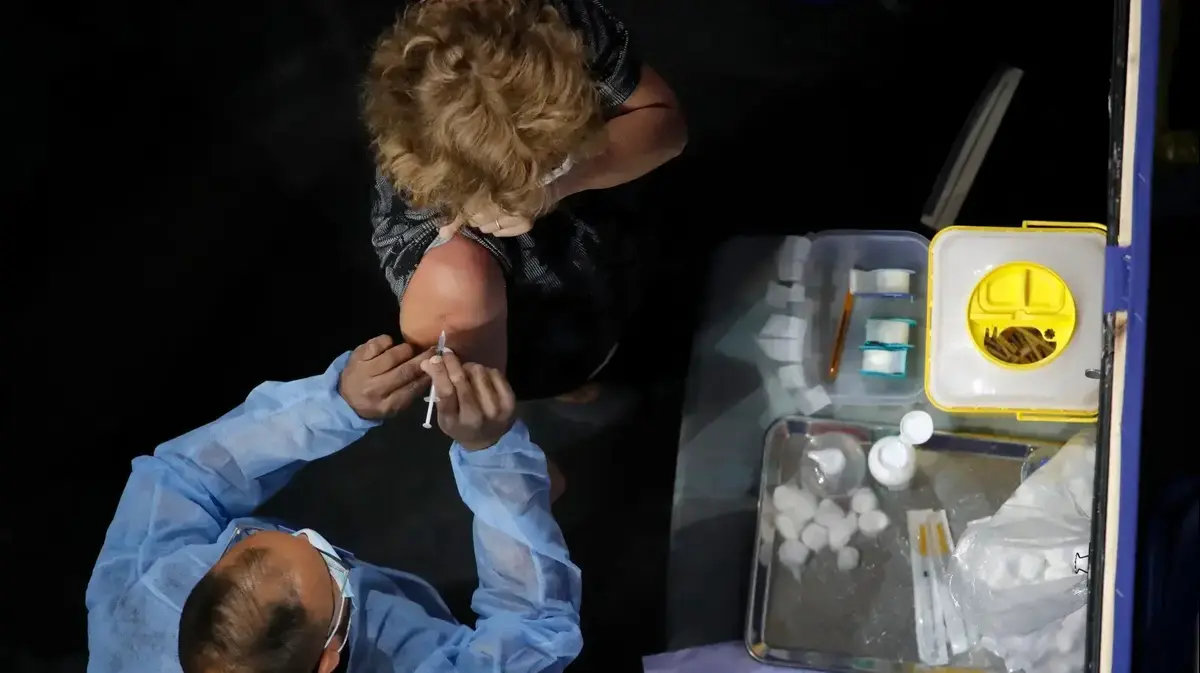news
World news
Europe
Only 4% received a second dose: the World Health Organization against the vaccination campaign in Europe
The organization has attacked the slow pace of vaccinations in the EU, which it says is prolonging the epidemic on the continent.
As it approaches one million deaths from the virus, so far only about 152 million doses have been given in Europe.
"Vaccines provide the best way out of the epidemic, but the pace is unbelievably slow"
Tags
Corona virus
World Health Organization
The European Union
Vaccine for corona
News agencies
Thursday, 01 April 2021, 19:00 Updated: 21:29
Share on Facebook
Share on WhatsApp
Share on general
Share on general
Share on Twitter
Share on Email
0 comments
Only 10% of the population in Europe received one dose of the vaccine.
Germans queuing for vaccine compound in Berlin (Photo: AP)
The World Health Organization today (Thursday) attacked the slow pace of the EU's vaccinations, which it claims is leading to an extension of the epidemic on the continent.
The operation suffers from many delays due to fears among some countries about the use of AstraZenica and Oxford vaccines, although the World Health Organization and the European Medicines Agency recommend continuing to use it despite several cases of blood clots among vaccinated people, which are not at all clear from the vaccines themselves.
"Vaccines give us the best way out of this epidemic, but the pace of vaccines is unbelievably slow," said Hans Kellogg, Europe's regional director at the World Health Organization.
"We must accelerate the process by increasing production, reducing barriers to vaccination and using every dose we have in stock, and now," he said in a statement.
According to the organization to date only 10% of the total population in Europe have received one dose of the vaccine, and only 4% have completed immunization in a second dose.
The organization includes 53 countries and territories in Europe, including Russia and some countries in Central Asia.
More on Walla!
Corona in Europe: Loads in departments in France, UK are satisfied with the pace of vaccinations
To the full article
More on Walla!
Vaccine War: Europe tightens export restrictions and tightens front with Britain
Stopping Asteracea Vaccines Parties Europe: "Benefit Highers Risks"
The technology in shoes that will save you from back and knee pain
The most dominant British variant in Europe.
Woman receiving Pfizer vaccine in France (Photo: AP)
To date, more than 152 million dishes have been served in the European region, about 25.5% of all dishes served in the world.
About 12% of the world's population lives in Europe, according to the organization's definition.
On average, 0.31% of Europeans receive a dose every day.
Although this is almost double the rate of the rest of the world, standing at 0.18%, it is much lower than that of the United States and Canada at the top of the list with 0.82%.
The organization, which belongs to the United Nations, described the negative trend on the continent as "the most alarming we have seen in recent months", with 1.6 million new cases recorded last week, compared to less than a million five weeks ago. only those in the Americas. Dorit Nitzan, Director of emergency region Europe organization, warned that the pace of the rapid spread of the virus increases the risk from the emergence of new variants and worry. she said that curbing the infection through controls basic disease is "critical."
the organization notes The British variant is the most dominant in Europe, and exists in 50 countries. Due to the fact that it is more contagious and can increase the risk of hospitalization, the organization called for expanding the range of infection rates among all age groups, except those aged 80 and over. The tests, detection of contacts, means of isolation and genetic sequencing.
The Spanish capital between the regions with the sharper rise in the country.
Women wearing masks in Madrid (Photo: Reuters)
The organization further called for avoiding closures through "scheduled and targeted interventions," except in cases where the disease "stretches to the limit the ability of health services to treat patients properly."
27 countries in Europe are in total or partial closure, and 21 are subject to a night curfew, including France, whose president Emanuel Macron announced yesterday the closure of schools for three weeks and further restrictions on movement for at least a month.
"The third wave is here," French Prime Minister Jean Castex warned Parliament today, detailing the government's steps.
Among other things, the sale of alcohol in public spaces will be banned.
The infection is on the rise in Germany, with about 24,000 cases diagnosed in the last day - almost 90% of which are linked to the British variant.
A new German study shows that only about 25% of people have confidence in the government's immunization strategy.
Astra Zenica's vaccine has been restricted to those aged 60 and over in the country, and 40% of respondents said they were not interested in getting vaccinated.
Some 35,000 German doctors will start offering vaccines in their clinics after Easter, which falls on April 4, and 1.4 million vaccine doses have been ordered for this part of the immunization campaign.
Spain also sees an increase in cases with an average of 152 cases per 100,000 in the last two weeks.
Madrid and Navarre in the north of the country are among the regions with the sharper rise.
Meanwhile, Vienna, the capital of Austria, along with two other provinces in the east of the country, imposed a closure at Easter to ease pressure on hospitals.
The Austrians were instructed to stay at home, except for necessary activities such as buying groceries, working, exercising and assisting their families.
Share on Facebook
Share on WhatsApp
Share on general
Share on general
Share on Twitter
Share on Email
0 comments









